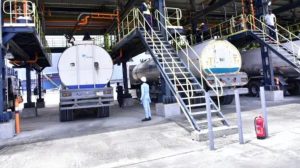The Nigerian Federal Government is gearing up for a comprehensive review of the Safe Schools project, a vital initiative designed to enhance security in educational institutions across the country. This review, expected to culminate in a national summit, will bring together stakeholders from all 36 states and the Federal Capital Territory to assess the progress made, identify challenges, and chart a course for future improvements. The summit, though imminent, has not yet been assigned a specific date, with the National Coordinator of Financing Safe Schools in Nigeria, Halima Iliya, indicating a desire to finalize engagements with the Southwest region before convening the summit. This meticulous approach underscores the government’s commitment to ensuring a comprehensive and inclusive review process.
A key component of the Safe Schools project is the establishment of a centralized monitoring platform. Over 11,000 schools have already been registered on this platform, according to Rabiu Muhammad, Commander of the National Safe Schools Response and Coordination Centre. This digital infrastructure plays a crucial role in enhancing communication and coordination between schools and security agencies, enabling swift responses to potential threats. The registration process, Muhammad emphasized, is not intended for revenue generation but rather serves as a vital mechanism for proactive security management. This registry allows for efficient data collection and analysis, providing a clearer picture of the security landscape across educational institutions.
The Safe Schools project faces significant financial hurdles. Despite an initial budget allocation in 2023, subsequent years, specifically 2024 and 2025, witnessed zero budget allocation, severely hampering the project’s implementation. This budgetary constraint poses a substantial threat to the project’s sustainability and its ability to achieve its long-term objectives. The initial projection was to secure all schools by 2026, with the project running from 2023 to 2027. However, the lack of consistent funding has created a considerable setback. The alarming reality, as highlighted by Muhammad, is that approximately one-third of schools in Nigeria remain vulnerable to security threats. This underscores the urgent need for increased financial commitment to ensure the safety and security of students and educators.
The genesis of the Safe Schools initiative can be traced back to the tragic abduction of schoolgirls in Chibok, Borno State, in 2014. This harrowing incident galvanized international attention and prompted the development of a concerted effort to protect schools from attacks and ensure the safety of students and staff. Spearheaded by Gordon Brown, the United Nations Special Envoy for Global Education, in collaboration with the Nigerian Global Business Coalition for Education and private sector leaders during the World Economic Forum on Africa, the project was conceived as a multi-faceted approach to address the complex security challenges facing Nigerian schools. The initial funding for the Safe Schools Fund comprised a $10 million contribution from the Federal Government matched by a $10 million pledge from the private sector, demonstrating a shared commitment to safeguarding education.
The Safe Schools project employs a multi-pronged strategy to enhance security in educational institutions. This includes school-based interventions, community protection efforts, and specialized measures for schools located in high-risk areas. School-based interventions encompass a range of activities, such as security training for staff and students, the implementation of safety protocols, and the installation of security infrastructure. Community protection efforts focus on fostering collaboration between schools and surrounding communities to create a safer environment for learning. This can involve community policing initiatives, awareness campaigns, and community-based security networks. Special measures for high-risk schools may include enhanced security presence, reinforced infrastructure, and specialized evacuation plans. This tailored approach recognizes the diverse security needs of schools across the country.
The upcoming review and national summit represent a critical juncture for the Safe Schools project. The review will provide an opportunity to assess the effectiveness of the project’s strategies, identify areas for improvement, and secure the necessary resources to ensure its long-term sustainability. The summit will bring together a diverse range of stakeholders, including government officials, education professionals, security experts, and community representatives, to foster a collaborative approach to addressing the complex security challenges facing Nigerian schools. The ultimate goal is to create a safe and conducive learning environment for all children, regardless of their location or circumstances. The success of the Safe Schools project hinges on the continued commitment and collaboration of all stakeholders, as well as the provision of adequate and sustainable funding. The safety and security of Nigerian schools remain a paramount concern, and the upcoming review and summit offer a crucial opportunity to strengthen the project and ensure its long-term impact.













